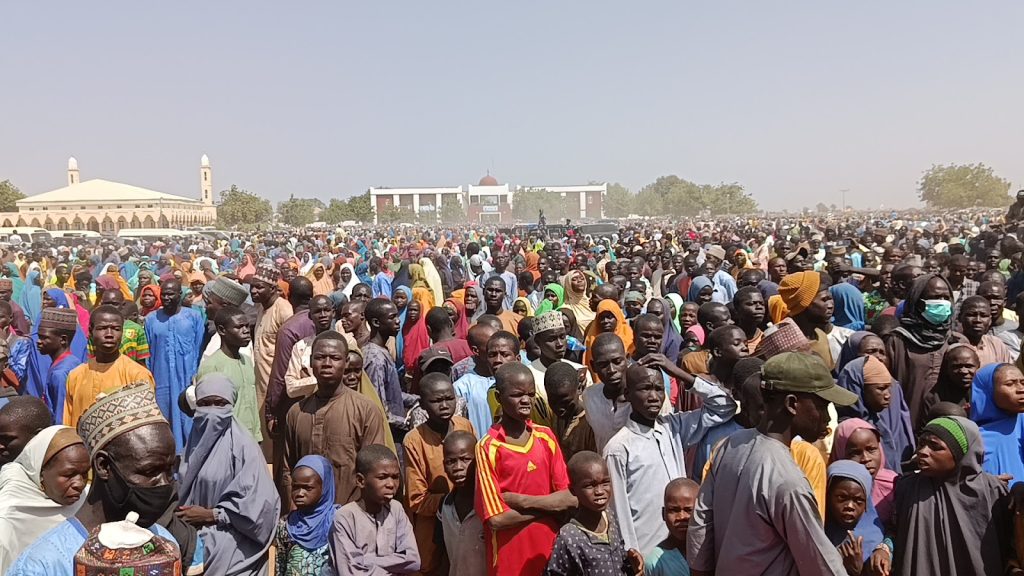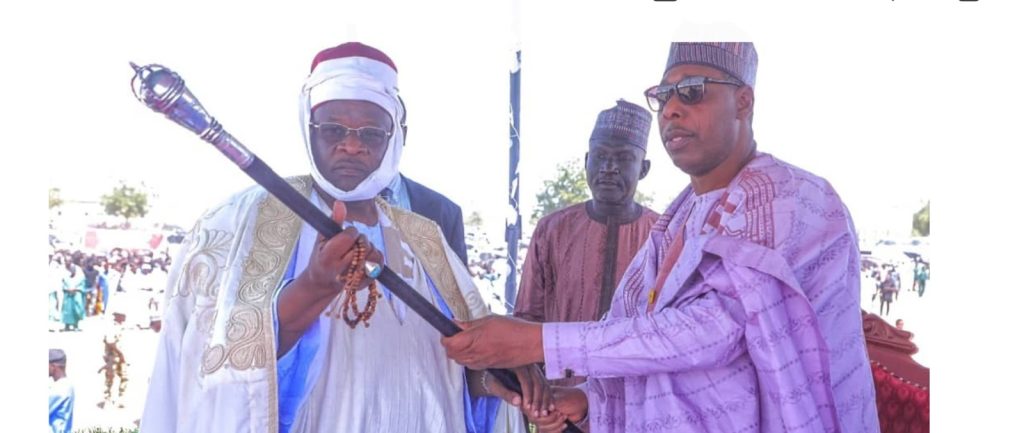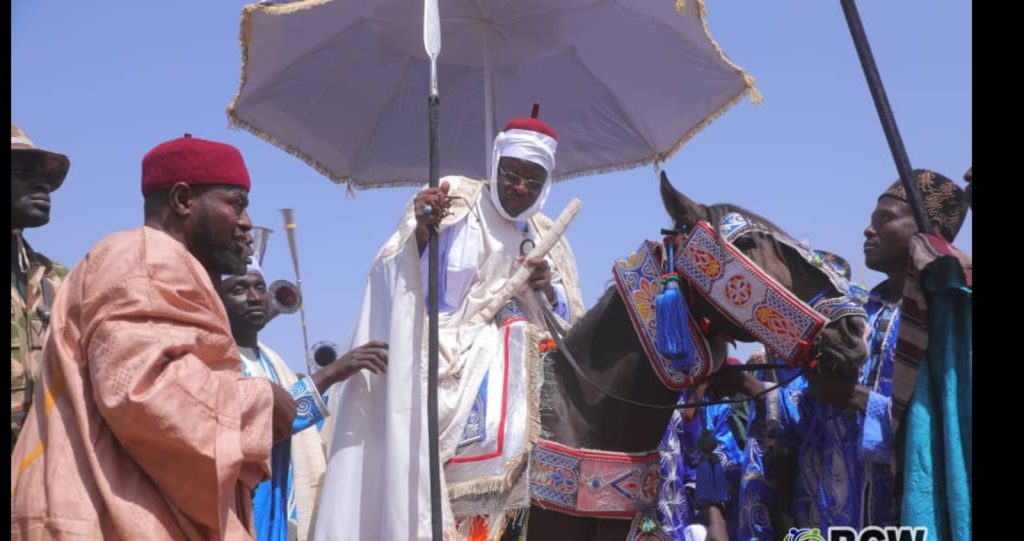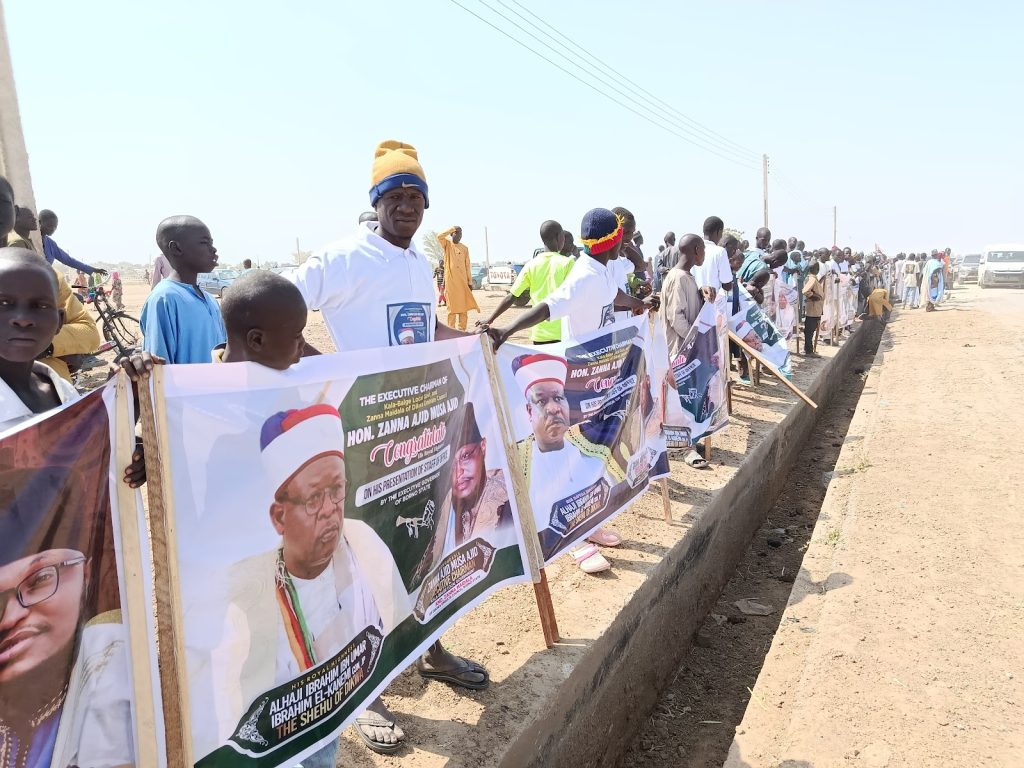Dikwa, a border community in Borno State, North East Nigeria, erupted in celebration on Saturday, Feb. 8, as it officially installed its 13th Shehu, Ibrahim Ibn Umar Ibrahim. The event marked a milestone in the town’s recovery, years after its residents were forced into displacement by Boko Haram insurgents.
The new monarch’s coronation came at a crucial moment, coinciding with the large-scale return of displaced persons to the town. Dikwa had been overrun by Boko Haram militants seven years ago, forcing its people to flee and leading to the occupation of the Shehu’s grand palace—the second most prestigious traditional seat in Borno—which the insurgents repurposed as their headquarters.
The 12th Shehu of Dikwa, Alhaji Abba Tor Shehu Masta II, was installed in 2010 but spent much of his reign in exile due to insecurity. He passed away in Maiduguri in 2020. Although the new Shehu was appointed in January 2021, his coronation was postponed due to lingering security concerns.
“Nigeria’s battle against terrorism in the North East is gradually coming to an end,” said Borno State Governor Babagana Umara Zulum. “I would like to commend the efforts of the Nigerian military, other security agencies, the Civilian Joint Task Force, and the people of Borno State for their resilience during these challenging times. I am pleased to report that Borno State is experiencing substantial improvements in peace and security, marking a positive shift from past difficulties.”

Thousands of residents, many of them returning internally displaced persons, lined the streets to celebrate as Dikwa’s royal kingmakers performed the traditional rites, formally installing the Shehu as the custodian of the emirate’s heritage.
Governor Zulum, who presented the staff of office to the new monarch, urged him to lead with fairness, justice, and inclusivity. “The selection of the new Shehu of Dikwa was marked by a peaceful and harmonious process. This transition reflects the respect for tradition and the rule of law that defines the Dikwa Emirate,” Zulum said.

Addressing the Shehu, Zulum said, “Your Highness has ascended the throne in an era remarkably different from that of your illustrious predecessors. These modern times require your best efforts in providing leadership and direction. Ours is a State that has been bedevilled by years of insecurity. The process of recovery is a collective responsibility for all. So, you have a greater responsibility to change the people towards the entrenchment of peace and development of the emirate.”
The Shehu expressed gratitude to those who supported his coronation, including the governor, the Sultan of Sokoto, and other traditional rulers. He pledged to uphold his responsibilities and support government initiatives that prioritise the welfare of his people. “I promise to uphold the oath administered on me. I will continue to support the people-oriented programs and services of the government,” he said.
He also thanked the Borno government for resettling displaced persons in Logomani and Gajibo villages and called for the extension of the Maiduguri-Dikwa road reconstruction to Kala Balge.
For many residents, the coronation symbolised a new chapter of hope. Amina Othman, a deputy registrar at the Borno State judiciary, said the occasion allowed her to reconnect with her ancestral home after years of displacement. “I am delighted, not just because I am related to one of the Shehu’s wives, but because this event has brought us together as a people. It reassures us of better days ahead,” she told HumAngle.
A storied emirate
Dikwa Emirate, a traditional state within Borno, is one of the successor states to the old Bornu Empire. Its establishment dates back to 1901, during the colonial period.

The old Bornu Empire collapsed in 1893 when the Shuwa Arab leader, Rabeh Zubayr Ibn Fadl-Allah, seized power and moved the capital to Dikwa. Following Rabih’s defeat and death at the hands of the French, they installed Shehu Sanda Kura, a member of the old Bornu dynasty, as the first Shehu of Borno in 1900. He was soon replaced by his brother, Umar Abubakar Garbai, the ancestor of the current Emirs of Borno.
Under a treaty between the French, Germans, and British, the old Bornu Empire was divided. Dikwa became part of the German colony of Cameroon, while Umar Abubakar Garbai was invited by the British to rule their portion. The Germans, in turn, installed Shehu Sanda Mandara, Abubakar’s brother, as the Shehu of Dikwa. Upon Mandara’s death in 1917, he was succeeded by Shehu Sanda Kyarimi. Dikwa was transferred to British control in 1918 following Germany’s defeat in World War I. Shehu Kyarimi was appointed Shehu of Dikwa in 1937, residing in Dikwa town. However, at the request of the colonial administration, he moved his palace to Bama in 1942.

The old Dikwa Emirate was subsequently divided into the new Bama and Dikwa Emirates in 2009. The new Dikwa Emirate comprises three Local Government Areas: Ngala, Dikwa, and Kala-Balge, with its headquarters in Dikwa Town.
Following the demise of Alhaji Shehu Muhammad Ibn Masta Elkanemi, the immediate past Shehu of Dikwa, his brother, Alhaji Ibrahim Ibn Umar Ibrahim, succeeded him on Jan. 30, 2021.
Dikwa, a border community in Borno State, North East Nigeria, witnessed a significant event as it celebrated the coronation of its 13th Shehu, Ibrahim Ibn Umar Ibrahim.
This marked a momentous occasion for residents returning after displacement caused by Boko Haram insurgency seven years ago, during which the Shehu’s palace was overtaken by militants.
The newly appointed Shehu assumes his role amid improved security conditions, following the passing of the 12th Shehu in 2020 and a year-long delay in coronation due to safety concerns.
Borno State Governor Babagana Umara Zulum lauded the Nigerian military and other agencies for their efforts in restoring security, urging the Shehu to lead with fairness and inclusivity. The new monarch expressed gratitude and committed to supporting government programs that prioritize the people’s welfare. The event was also a moment of reconnection for returning displaced persons, symbolizing hope for a better future.
The Dikwa Emirate, a successor state to the old Bornu Empire, has a rich history dating back to the colonial era. It experienced division and territorial changes, culminating in the establishment of the new Dikwa Emirate in 2009, now encompassing three local government areas. The recent coronation signifies a new chapter in stability and continuity for the storied emirate.
